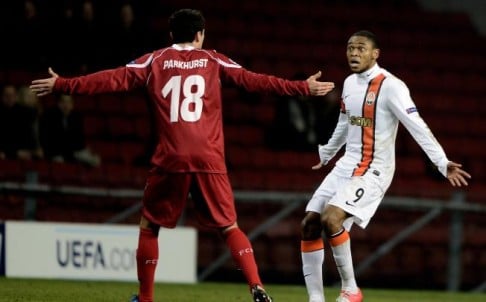McManaman tackle exposes flaws in retrospective action
The most horrible factor about the 2012-2013 season's worst challenge, by Callum McManaman of Wigan, is not the tackle itself, but the fact it has been surpassed by an even worse scenario: the FA's pathetic, retrospective review of the incident.
In incidents where a major injustice has occurred on the pitch and where match officials have, for whatever reasons, shown they have not properly dealt with the offence, taking retrospective action is a sensible process. It protects players, supports referees and safeguards the image of the game. It allows justice to be, and seen to be, done.
Unfortunately, the FA's challenge turned out to be a feeble sidestepping of the issue. The FA used a technicality to excuse itself from not taking retrospective action against 21-year-old McManaman for his awful tackle on Newcastle's 20-year-old defender Massadio Haidara.
It exposes serious flaws in the system and is not limited to England since all around the world, including Hong Kong, the retrospective review system is often ineffective. It doesn't successfully protect players, match officials or the image of the game. In hindsight, the retrospective review process needs to be reviewed itself, for justice's sake.
Here is the FA's statement on the McManaman incident: "Where one of the officials has seen a coming together of players, no retrospective action should be taken, regardless of whether he or she witnessed the full or particular nature of the challenge. This is to avoid the re-refereeing of incidents."
Referee Mark Halsey was honest enough to admit that he did not see the incident. Due to 51-year-old Halsey's poor positioning, his view of McManaman's challenge was blocked by another player. However, assistant referee Matthew Wilkes admitted seeing the "coming together" of the players and the FA has shamelessly used this as an excuse for not taking retrospective action against McManaman.
First, the claim that the FA wishes to avoid re-refereeing incidents is hypocritical. They do it often and they do it to undermine the credibility of match officials. For instance earlier this year, the FA rescinded referee Mike Dean's red card for Manchester City's Vincent Kompany. That is the very definition of re-refereeing.
Second, the FA's ignorance regarding the poor accuracy and credibility of the witness' view is embarrassing. Just because a linesman saw the incident does not mean he had a "good, near and clear view" to make a competent decision. In fact, the distance between the linesman and McManaman's challenge was at least 32 metres coupled to the reality that his main priorities lie elsewhere on the field. We know the linesman made a poor decision in assisting Halsey, so why not allow a retrospective review? If the FA is so willing to re-referee, say, Dean's perfectly clear and competent decision to send off Kompany, then why is it less enthused about re-refereeing the poor decision not to send off McManaman on the basis that the linesman vaguely saw the "coming together" of two players from a distance of over 35 yards?
Justice has not prevailed and the FA is seen to be hiding behind excuses. Newcastle, clearly outraged, officially announced the FA's disciplinary process to be "not fit for purpose" and have demanded a change in the rule that allowed McManaman to escape sanction.
If there is no perceived justice, then fans will be angry and jump at the chance to form their own kangaroo courts. Players, too, will sense the injustice and may take matters on themselves on the pitch.
In McManaman's case, he will be jeered in future matches particularly by Newcastle supporters and, as is the nature of the game, when he eventually falls victim to a nasty tackle, there inevitably will be those who will cheer and claim that it is "justice" served. No one deserves an injury or to be put at risk of danger, but because the public perception is that McManaman has escaped a previous sanction then these very real human feelings may come to the fore among some fans. Therefore, the FA urgently needs to demonstrate that its retrospective review system is "fit for purpose". As it stands, the FA's mishandling of McManaman's challenge has endangered player safety, left match officials out to dry and tarnished the image of the game.
In the modern professional era, on the pitch there are 22 millionaire mercenaries all trying to harass, hound and hoodwink a standard salaryman referee trying his utmost to be correct, impartial and consistent. Since video replays are unacceptable in a game, the post-match retrospective review is the second-best means available to sanction players, act as a deterrent to unsavoury behaviour and ultimately protect the image of the game.
However, competition organisers around the world are failing the game with their pathetic process of retrospective reviews.
This article appeared in the South China Morning Post print edition as McManaman tackle exposes flaws in retrospective action
PUBLISHED : Friday, 29 March, 2013
POST ARTICLE: Have things changed at the FA?









